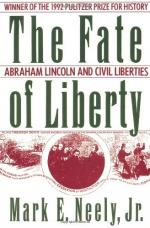
|
Chapter 1
• President Lincoln turns to Secretary of State William H. Seward for advice when Baltimore mobs burn bridges to prevent troop movement.
• Assistant Attorney General Titian J. Coffey recommends against martial law and the suspension of the writ of habeas corpus, citing the Articles of War (1806).
• While the writ of habeas corpus has never been suspended in the United States, citizens of other countries who have had the writ suspended in their countries have experienced oppression and abuse.
• Lincoln admires Andrew Jackson's decision to impose martial law in New Orleans during the War of 1812.
• Angry at the violence in Baltimore, Northern Republicans urge Lincoln to deal as harshly as needed with rebels to ensure passage on the railway.
• Lincoln first publicly proclaims the suspension of the writ in Florida on May 10, 1861.
• After John Merryman is arrested for raising forces for the Confederacy, and then given a writ of...
|
This section contains 2,826 words (approx. 10 pages at 300 words per page) |

|




